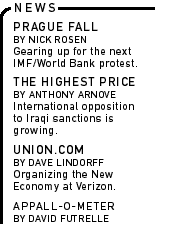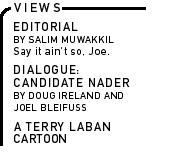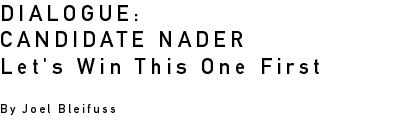 |

|

|

|

|
| |
 |
|
|
One recent evening in Minneapolis, two couples, longtime friends and Democratic Farm Labor Party activists, argued passionately over Gore and Nader. To vote for Nader was an exercise in self-indulgence, said one. The Democrats must be taught a lesson, said the other. The discussion ended when the Nader partisans got up in the middle of dinner and left the house. The Gore supporters fear the friendship has been irreparably damaged. That is just one example of the strong feelings the Nader campaign has aroused. If the volume of mail we've received at In These Times is any indication, this issue has divided the left like no other. By and large, the debate is over tactics, not policy. On almost all issues, Ralph Nader holds a better position than Al Gore. Minnesota Sen. Paul Wellstone acknowledged this during a recent interview on Minnesota Public Radio. "I'm not going to be attacking Ralph Nader, because I agree with him on many of the issues," Wellstone said. But he went on to explain that he plans to vote for Gore because too many votes for Nader could throw the election to Bush, who, as Wellstone puts it, "wants to repeal the 20th century." Nader supporters point to their candidate's superior position on the issues and maintain that the differences between Gore and Bush are not large enough to justify continued fidelity to the Democratic ticket. When asked on Meet The Press if he was worried about his candidacy throwing the election to Bush, Nader replied: "Not at all. I mean, you're dealing with Democratic do-littles and Republican do-nothings. And that's just not enough for the American people." Nader's absolutist argument strikes a chord with many. We on the left have always had a hard time distinguishing between compromising our beliefs (maintaining personal integrity) and engaging in political compromise (participating in the give-and-take of civil society). This sectarianism, though understandable, is something we must outgrow. As far as I can make out, the pro-Nader argument goes something like this: Bush may be worse than Gore, but it is time to take a stand against the Democrats' rightward drift and teach them a lesson. If in the short run under President Bush things are worse, in the long run they will get better. After all, if Gore loses, we won't have Lieberman waiting in the wings eight years from now, and the Democratic Party might return to its roots. Or, if the Democrats go down in flames because of the Nader campaign, out of the ashes will rise a bright and shining Green Party to reckon with. Unfortunately, too often things don't get worse before they get better - they just get worse and worse. Remember 1980, when progressive voters also argued that there was no difference between the Democratic and Republican candidates and that it was time to send a message to the powers that be. Those who "voted their conscience" and cast ballots for John Anderson or Barry Commoner, instead of Jimmy Carter, may have felt better, but those noble gestures were not much help during the Reagan administration for the air traffic controllers whose union was busted, the poor who found their access to legal aid curtailed, and the tens of thousands of people who died in the covert wars in Central America. In addition to real people really suffering, during 12 years of Reagan and Bush pĆre, national political debate shifted to the right, as did the Democrats under the influence of the Democratic Leadership Council (DLC). As a result, you had Democratic President Clinton championing a ham-fisted welfare reform package that aimed not to end welfare as we know it, but to defend his right flank in the 1996 election. Clinton could get away with that because there was no political organization on the left to challenge him. Centrist Democrats have the DLC to support their caucus in Congress, the New Democrat Coalition. Left-leaning Democrats lack their own version of the DLC. Consequently, members of the Congressional Progressive Caucus don't have the institutional infrastructure to put their ideas and policies into the public arena. (The Institute for Policy Studies has tried to build public support for the Progressive Caucus' Fairness Agenda, but the funding community, upon which we all depend, has shied away.) In his speech at Arianna Huffington's "Shadow Convention" in Los Angeles, Wellstone spoke of the need to build an organization that could provide the political muscle the left now lacks, fueled by people rather than corporate dollars - in other words, a progressive answer to the DLC. "Regardless of what point you take vis-ł-vis the vice president or Ralph Nader," Wellstone said, "when this is over I believe we need to build an independent political force - I didn't say third party - some kind of vehicle whereby we put forward the ideas, we put forward the policies, we recruit people to run for office, and we back them up with people who know how to manage campaigns. I'm tired of waiting." Amen. That's the long-term tack to take. But first we have to get through November, remembering, I hope, that while the Democrats are far from perfect, there is a difference between them and the Republicans. That difference makes a difference, maybe not to the well-being of middle-class Nader supporters, but certainly to those people whose quality of life depends on federal programs. |
